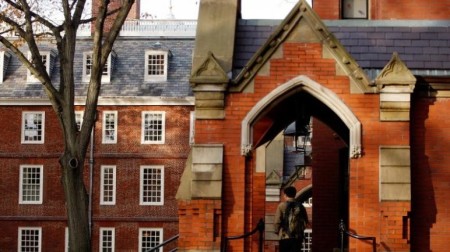Harvard Has Abandoned God and Its Christian Principles

When Kelly Monroe Kullberg's book, Finding God at Harvard, came out in 1996, those who followed The New York Times' Best Sellers could not miss the title's reference. Several years earlier, Ari Goldman's The Search for God at Harvard (1991) not only made the list but was named a "Notable Book of the Year" by the Times.
The difference between the two books is stark. Goldman's spotlights a Harvard where religion is celebrated, as long as it is not the Christianity of the school's founders, especially with its claim to salvation exclusively through Christ. Kullberg's spotlights Christians whose faith survived and even thrived in an environment where hostility to the Gospel vainly tries to hide behind the mask of tolerance.
This mask fell off in dramatic fashion last month when Harvard's Office of Student Life placed the university's largest Christian student group, Harvard College Faith and Action (HCFA), on a one-year "administrative probation" for asking one of its leaders to step down for having a lesbian relationship. A few days later, the College demanded that HCFA disaffiliate from its parent organization, the Christian Union, whose Statement of Ethics includes "The reaffirmation that sex belongs only in the context of marriage between a man and a woman."
The attempt to destroy religious freedom by telling followers what kind of leaders they must have is not new. It has been a favorite tool of totalitarian governments, from the Nazis to the Communists. But how could this happen at an academic institution in a land where religious freedom is part of society's foundation? And how could it happen at Harvard, of all places?
Like most of Western academia today, Harvard drinks deeply from the wells of dogmatic pluralism which teaches that anyone who makes exclusive truth-claims must be a hateful person and is therefore to be hated. Yet Harvard's seal continues to testify to the very exclusivity it now rejects, with the word "Veritas" (Latin for "Truth") encircled by "Christo et Ecclesiae" (Latin for "Christ and Church"). It bears witness to an inconvenient historical truth: Harvard was founded in 1636 for the purpose of training Christian ministers.
Within a century, the Christian zeal that led to the founding of both the New England colonies and the colleges of Harvard and Yale (in 1701) had begun to wane, and revival was needed. The First Great Awakening of 1730-1755 held back the tide of unbelief that rolled across that Atlantic during Europe's Enlightenment, but not for very long.
According to historian Nathan Hatch, in 1782, with the end of the American Revolution in sight, only two students professed Christianity at the newest Ivy League school originally established for ministers at Princeton. By 1800, only five students belonged to Yale's college church. According to another historian, J. Edwin Orr, a poll taken at Harvard concluded that none of its students were believers, and eventually the president was forced to resign.
In other words, we've been here before.
The late 1700s were spiritually dark days, not only for college campuses, but for the nation as a whole. Eight years of war with Great Britain had a devastating effect on the American church. Deism, Unitarianism, and even radical skepticism were everywhere.
And like today, the unbelief of those times was hostile unbelief. In his lecture titled, "The Role of Prayer in Spiritual Awakening" (available on YouTube), Orr tells us that it was accompanied by violence and persecution. Christians and Christianity were openly mocked. Sound familiar?
But the Second Great Awakening (1790-1840) had already started. Thankfully, Princeton recovered and became a pillar of the 19th century Christian church. But some colleges never fully returned to their Christians root. Harvard became a center of Unitarianism in the 19th century.
And so here we are again.
What was it that rescued the United States from the brink of total abandonment to unbelief? Church historians of the period credit two things: the zealous preaching of the word of God and sustained corporate prayer. The 18th century theologian of the First Great Awakening, Jonathan Edwards, coined the phrase, "concerts of prayer," to describe what was involved in the latter: Christians from across denominational boundaries gathering together to implore the Lord to bring spiritual healing to our land. And, of course, this must be coupled with faithful preaching. These are the things that Holy Spirit promises to use in our churches and in our lives as Christ's ambassadors to a lost world.
Ron Henzel is the Senior Researcher at Midwest Christian Outreach, Inc, co-author of A Matter of Basic Principles: Bill Gothard and the Christian Life and co-host of The Unknown Webcast. He has an M.A. in Biblical Studies from Wheaton College (IL) and is an elder at Providence Christian Church, Cape Coral, Florida.




















